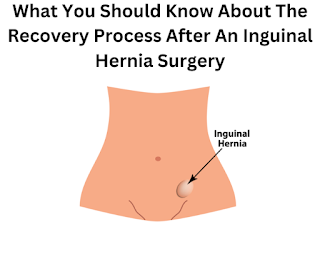What You Should Know About The Recovery Process After An Inguinal Hernia Surgery
An inguinal hernia occurs when a portion of the small intestine protrudes through a weak spot in the abdominal muscles. This can occur on either side of the body but is more common on the right side. Symptoms of an inguinal hernia include a bulge in the groin area, pain or discomfort when coughing or lifting objects, and a burning or pulling sensation in the groin. If left untreated, an inguinal hernia can lead to serious health complications.
The surgerySurgery is the most
common treatment for an inguinal hernia. Inguinal hernia surgery is typically a
safe and effective procedure. However, as with any surgery, there are some
risks involved.
The most common
complication of inguinal hernia surgery is pain. Pain at the surgical site is
usually mild and can be controlled with medication. Some people may also
experience numbness or tingling around the surgical site. These sensations
usually resolve within a few weeks.
There is also a small
risk of infection at the surgical site. Symptoms of an infection include redness,
swelling, and drainage from the incision. If you develop these symptoms, it's
important to see your doctor right away so that the infection can be treated.
Another potential
complication of inguinal hernia surgery is damage to the surrounding nerves or
blood vessels. This complication is rare but can lead to serious problems such
as bleeding or infection.
Overall, inguinal
hernia surgery is a safe and effective way to treat an inguinal hernia.
Complications are rare but can occur. If you have any concerns about your
upcoming surgery, be sure to talk to your doctor so that you can make an
informed decision about whether or not this procedure is right for you. If you
are staying in Agra, there are many HerniaSurgeons in Agra who can offer expert opinions on the same.
Recovery
process
The recovery process
after surgery for an inguinal hernia can vary from person to person. Generally,
you can expect to stay in the hospital for one to two days after your surgery.
During this time, you will be closely monitored and given pain medication as
needed. Once the hernia specialist inAgra discharges you from the hospital, you will need to take it easy for a
week or two. This means no heavy lifting, straining, or strenuous activity.
After a few weeks, you should be able to return to your normal activities.
Diet and
lifestyle during recovery
After you have surgery
to repair an inguinal hernia, you will need to make some changes to your diet
and lifestyle. These changes will help you recover from surgery and prevent
future hernias.
You should eat a high-protein diet during your recovery. This will help your incision heal and reduce the risk of another hernia. Good sources of protein include lean meats, poultry, fish, legumes, and eggs. You should also eat plenty of fruits and vegetables. These foods are rich in vitamins and minerals that will help your body recover from surgery.
After you have surgery
to repair an inguinal hernia, it is important to take some time to recover.
During this time, you should not do any strenuous activity. This includes
lifting, pushing, or pulling anything heavier than 10 pounds. Once you have
healed and your doctor gives you the okay, you can slowly start to return to
physical activity.
Start with light activities such as walking or gentle stretching. You can gradually increase the intensity of your workouts as your body gets stronger. It is important to listen to your body and not overdo it. If you start to feel pain, stop and rest.
Overall, the recovery
process after inguinal hernia surgery is fairly straightforward. However, it is
important to follow your doctor's instructions carefully and take things easy
for the first few weeks to ensure a successful recovery. With time and
patience, you should be able to get back to your normal activities and enjoy
your life without pain or discomfort from your hernia.




Comments
Post a Comment